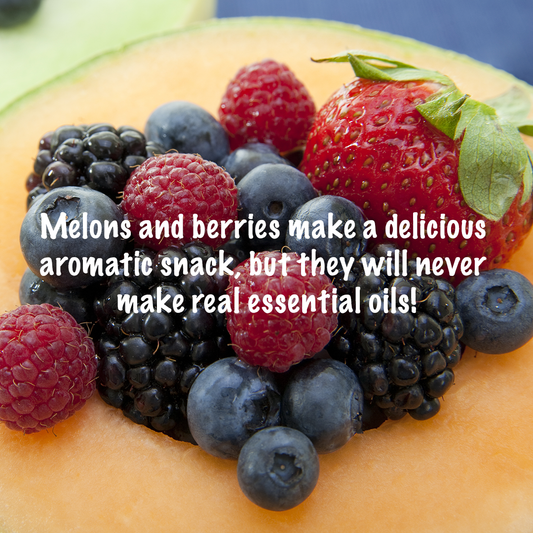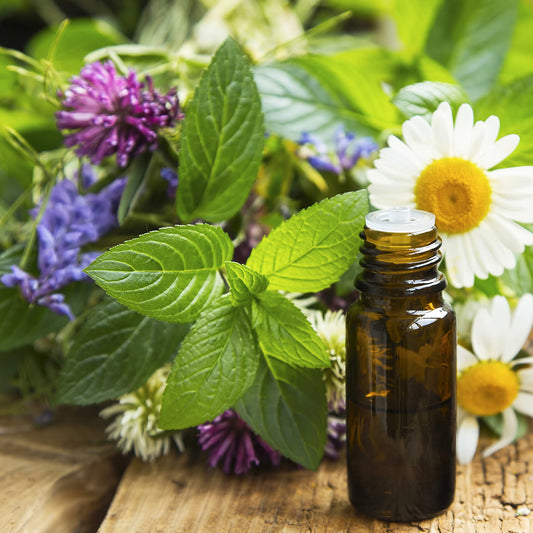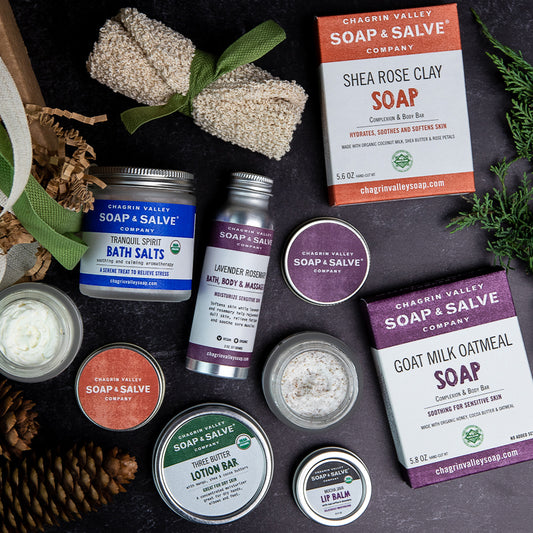What is "Natural" Fragrance Oil?
As more and more consumers are demanding "natural" skincare, companies are continuously looking for ways to meet that demand. Over the last few months, we have received numerous emails asking about "Natural Fragrance Oils." Just last week a woman wrote the following email:
"I hope you can help since you guys seem to know a lot about natural products. I just bought this cream that says "natural perfume" in the ingredients. Is it ok to use this product?"
 This person was not a customer and it is not my place to tell folks what to use or not to use. But as a teacher--well this is definitely a teachable moment.
This person was not a customer and it is not my place to tell folks what to use or not to use. But as a teacher--well this is definitely a teachable moment.
Our love of fragrance has been around for millennia and is deeply rooted in many cultures. As early as 2000 B.C. the Ancient Egyptians were extracting natural plant essences to use on their bodies.
Considering our infatuation with scent, it is no surprise that the global market for fragrances and perfumes is projected to reach $51 billion dollars by the year 2022. Source
To me, the words "100% natural fragrance" do not make sense. I have always believed that the word "fragrance" was by definition, a synthetic scent.
“What's in a name? That which we call a rose by any other word would smell as sweet.” Juliet speaks these words (written by William Shakespeare) to Romeo to imply that his family name has nothing to do with their love. A name is just a label to distinguish one thing from another.
But when an ingredient labeled “fragrance . . .” appears on a personal care product what does it mean? So what's in a name?
Different Types Of Fragrance
Although the focus of this blog is on "Natural Fragrance Oils" I want to briefly describe the other types of aromatic scents for comparison.
- Essential Oils
- Synthetic Fragrance Oils/Nature Identical Fragrance Oils
- Natural Fragrance Oils
What Are Essential Oils?
 The essential oils within a plant are Mother Nature's natural scent creations.
The essential oils within a plant are Mother Nature's natural scent creations.
Powerfully fragrant and concentrated, essential oils are the pure natural aromatic essences from a variety of aromatic plant materials including grasses, leaves, flowers, needles, twigs, peels of fruit, seeds, bark, and roots.
The chemical profile of an essential oil determines its scent and overall quality.
Essential oils are not only highly therapeutic aromas, but they often provide healing properties or other therapeutic benefits not found in human-made or synthetic aromatics.
The word "fragrance" will never be used in an ingredient list to mean an essential oil. You will always see the word "essential oil."
For a lot more information on Essential Oils please read our blog, "What Are Essential Oils?"
What Are Synthetic Fragrance Oils?
There are two types of synthetic fragrance oils
- Typical Fragrance Oils
- Nature-Identical Fragrance Oils
Typical Fragrance Oils are made in a laboratory from synthetic compounds and are composed almost entirely of petroleum by-products such as benzene derivatives, aldehydes, toluene, and other known toxic chemicals. They are much cheaper, offer greater variety, and utilize scent binders like phthalates to help retain their aroma for a longer period of time. Chemists can create lovely scents produced through chemical reactions that have no corresponding scent in nature. Synthetic fragrance oils are completely human-made from chemical compounds that do not exist in nature.
The words "Nature Identical" are quite deceiving since these oils are completely or partially synthetic and definitely NOT natural. The are synthetic oils built totally from materials that are not natural or they may be blends of natural essential oils and synthetic aromatic compounds.
The difference between creating a "Nature Identical" fragrance oil and synthetic fragrance oil is that in the end, the Nature Identical Oil has a chemical structure that is the same as its essential oil or plant counterpart. It is basically a human-made copy of a molecule found in nature and smells like its natural equivalent.
These scents are often listed as "fragrance," "parfum," or "nature-identical" oils on the ingredients list. There are some fragrance oils that may contain a small percentage of essential oils. However, the addition of a little bit of essential oil does not mean they are natural.
For more information on Synthetic Fragrance Oils please read our blog, "Why Are Synthetic Fragrance Oils So Popular?"
What Are Natural Fragrance Oils?
Each essential oil contains tens of hundreds of natural components called ISOLATES. Isolates are single molecules that can be ‘isolated’ or extracted from whole essential oils and natural raw materials existing in nature.
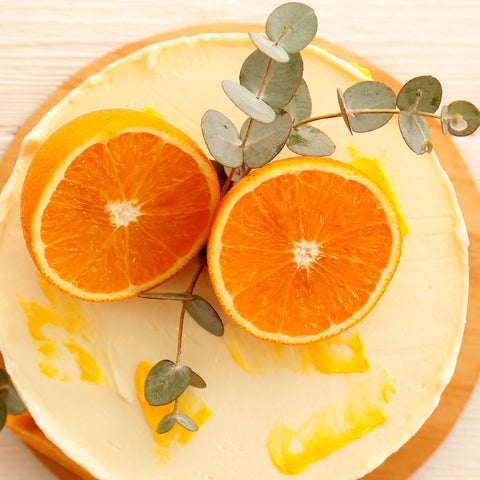 For the purpose of scent creation these single isolates are extracted because of their scent notes and aroma, NOT their therapeutic qualities. As you will see below, many unrelated plants, such as oranges and eucalyptus, share common isolates.
For the purpose of scent creation these single isolates are extracted because of their scent notes and aroma, NOT their therapeutic qualities. As you will see below, many unrelated plants, such as oranges and eucalyptus, share common isolates.
Natural Fragrance oils are also human-made in a laboratory but rather than being created from synthetic materials they are produced by taking single isolates from a variety of different natural aromatic material and recombining them to from a complex scent.
Although isolates have been part of the perfuming industry for quite a long time, they are now popping up all over the world of "natural" skin. care.
Natural fragrance oils are blends of isolates that are extracted through the same processes that are used to obtain essential oils. The difference is that ...
- when you extract an essential oil you are extracting the entire complex scent compound
- when you extract an isolate you are extracting a single scent molecule
The Science Behind Natural Fragrance Oils
The chemistry of essential oils is quite fascinating, but that discussion is for another blog.
Pure essential oils have a complex composition. The chemical profile of a single oil may contain hundreds of individual constituents from a variety of chemical families.
For the purpose of this blog discussion, I am using 5 different essential oils and listing only the basic major constituents of each oil in descending order. Because essential oils are pure botanical extracts, the ratio of the constituents and even the constituents themselves may change depending on the many factors that influence the plant growth (such as geographic location, temperature, soil, humidity, and rain) harvest time, extraction method and other factors.
As you can see this can get quite complicated. Typically, essential oils are highly complex mixtures of often hundreds of individual aroma compounds.
Table of Essential Oils and Major Constituents

Look at the table of essential oils above. If you have had the opportunity to smell each of these essential oils, or even the plants from which they come, you would agree that they do not smell the same. Even with your eyes closed, it would not be difficult to tell the difference between an orange and a eucalyptus leaf. But notice that Mother Nature has included Limonene in each of these oils.
According to the database in the US National Library of Medicine, "Limonene is a clear, colorless liquid hydrocarbon classified as a cyclic monoterpene, and is the major component in oil of oranges."
The definition doesn't really matter, just know that a basic Sweet Orange Essential oil is made up of over 90% limonene.
So, if a fragrance chemist wants to make a fragrance that smells like an orange or needs a bit of orange scent, she could isolate the limonene from orange essential oil or any other essential oil that contains limonene in its chemical profile. She would then have a limonene isolate that can be added to other isolates to create a natural fragrance oil.
If you are a label reader then you may have noticed words like Eugenol, Citral, Geraniol, Limonene, or Linalool listed on an ingredient list. These are isolates added together to create a specific scent blend.
The PROS of Natural Fragrance Oils
They Are Made From Natural Ingredients
It is interesting to note that the food industry pushed for "natural flavors" way before the perfume industry. As more and more consumers were demanding more "natural" food products large companies had to look for ways to create their beloved synthetic flavors using natural ingredients.
Since natural fragrance and flavor oils are made from isolates obtained from natural essential oils rather than being made from synthetic compounds, companies can state "made with only natural flavors" and consumers feel better about using them.
Consumers who are looking for healthy skin care for themselves and their families perceive Natural Fragrances to be safer and more healthy than their synthetic counterparts.
Variety is the Spice of Life
Many folks have grown accustomed to the large variety of scents available from stores like Bath and Body Works. It is difficult and sometimes impossible to obtain certain scent blends with pure essential oils. There is a much greater variety of blends available with fragrance oils but they are not natural--so enter isolates.
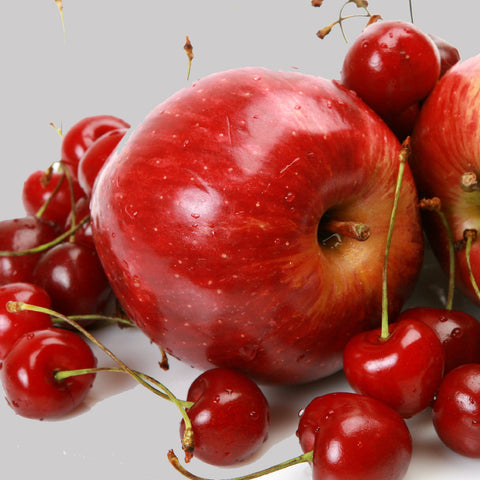 Isolates can be valuable when a very specific scent is necessary for the creation of a specific scent profile and you do not want something synthetic. The isolates from different essential oils can be recombined to create a totally new scent blend profile. Think about cooking, sometimes just a pinch of the right spice can make all the difference in the flavor.
Isolates can be valuable when a very specific scent is necessary for the creation of a specific scent profile and you do not want something synthetic. The isolates from different essential oils can be recombined to create a totally new scent blend profile. Think about cooking, sometimes just a pinch of the right spice can make all the difference in the flavor.
Let's say there are about 50 different safe, pure essential oils that have lovely aromas. Mathematically that should give us quite a lot of combinations. However, we know that many essential oil profiles do not blend well with each other. Once we extract and isolate the individual constituents, we can use the isolates to create an endless number of scent profiles.
Where once scents like cherry, apple, papaya, blueberry, or watermelon were completely synthetic, it is now possible to create these scents combining isolates from the aromatic compounds of a variety of plants.
Uniformity
When Mother Nature builds a scent blend there are a lot of variables that can get in the way of consistency.
Plants are affected by geographic location, yearly weather conditions such as sunlight and rainfall, soil conditions, fertilizers used and more. All of these factors vary from crop to crop and region to region, affect a plant’s chemistry, and thus the quality and aroma of the natural essential oil.
As a result, you will notice a variation in the aroma of different essential oil batches. While this variation is normal and expected of a pure natural ingredient, it makes it difficult for natural or organic companies to produce products in which the scents are always the same. We often receive emails from customers asking why their favorite scented soap or cream doesn’t smell exactly the same every time.
By using isolates a company can alter an essential oil’s chemistry by adding isolates or create a "nature identical oil" in order to ensure uniformity. When a scent profile is built in a lab the conditions are controlled and consistency maintained. Consumers expect that type of consistency in fragrances created by the cosmetic industry.
Cost
 In a market once dominated by essential oils, cost has become a major factor in commercial fragrance production.
In a market once dominated by essential oils, cost has become a major factor in commercial fragrance production.
Natural fragrance oils can still be expensive because they are comprised of isolates of pure essential oils and the methods used to extract pure essential oils are time-consuming, expensive, and require a high degree of expertise.
However, because the scent profiles can be built from isolates that come from a variety of essential oils, some of the more expensive natural scents are available at a much cheaper cost.
For example, pure neroli essential oil, steam distilled from the flowers of Citrus aurantium, (orange tree) can cost over $500 for one ounce. But if I can make an ounce of natural neroli fragrance oil by extracting the isolates needed from less expensive plants and then putting them together--voila--a cheaper "natural" neroli oil.
Longevity and Intensity
Essential oils, just like any natural plant material, degrade over time, lose potency, and eventually their smell. When building a scent profile with isolates you can use scent anchoring isolates that will help prolong the scent.
More Environmentally Friendly?
Some companies like to tout that they choose fragrance oils over essential oils because many essential oils are not environmentally friendly.
This is only true if a company chooses to use essential oils that come from endangered plants. For example, an essential oil like sandalwood is harvested by killing the entire tree.
As a company committed to making natural products, we are also committed to our planet and its people. So we do our research and buy sustainable ingredients from companies that share our commitment.
At Chagrin Valley we choose to use essential oils that come from plants that are not endangered and are sustainable.
In all fairness, if a company wants to make products with expensive scents or fragrances from endangered species such as Sandalwood, Rosewood, or Frankincense then they are probably better off using natural fragrance oils rather than synthetic ones.
For more information please read our blog, "How We Decide What Scents Not to Use?"
The CONS of Natural Fragrance Oils
They Have Lost The Natural Synergy
Each essential oil is a synergistic blend of tens of hundreds of natural, therapeutic components.
The word “synergy” comes from the Greek word "synergi," which means “to work together.” The old saying, "The whole is greater than the sum of its parts," expresses the basic meaning of synergy. In nature, no isolated part of a whole works well alone. The same can be said for an individual fragrance isolate.
In the chemical profiles created by Mother Nature, the isolates interact with each other and other plants parts to create a wholesome essential oil.
The synergistic components of an essential oil work together to create a unique ingredient that can heal, reduce stress, promote sleep, encourage concentration and more.

One single oil may contain hundreds of individual constituents from a number of chemical families. These unique natural combinations are a vital part of the therapeutic value of essential oils.
While it is possible that isolates may be therapeutic separately, studies have shown that there is an increased benefit when using the whole oil designed by nature where nothing is isolated, added or removed.
Although some constituents in a natural fragrance may offer some aromatherapy effects, the synergy present in the natural plant is missing.
Mother Nature did not create these complex oils to soothe our passion for fragrance, essential oils play an important role in the life of a plant. They have a purpose in plants that helps them adapt to their environment by providing protection and attracting pollinators.
As more studies are being done on essential oils and their chemical makeup, our knowledge of the effects of essential oils continues to grow. But there are still unanswered questions.
- Do the properties of natural isolates function differently when removed from their natural state?
- Also, when these natural components are combined with isolates from a different plant how does that affect the way in which they work together?
Chemically speaking it may be true that there is no difference between a Natural Identical orange scent, a Natural Fragrance orange oil scent and an Essential Oil orange scent.
One problem is that although scientists may make no differentiation between something created in a lab and something created by Mother Nature, our bodies often do.
By using fragrance oils made with isolates instead of using pure whole essential oils, we are trading the powerful complex therapeutic and aromatic properties that essential oils have to offer for a simple scent.
Proprietary Information Means No Transparency
Take a look at the label on a "natural" skincare product. Does it have the words "natural fragrance," "fragrance," or "parfum" on the label? Contact the manufacturer and ask, "what's in the fragrance?" If they don't actually make the fragrance they will not be able to tell you, because they don't know. If the company makes the fragrance they will not tell you because they don't have to disclose that information.
Fragrance Manufacturers and Perfumers keep their blends of Natural Fragrance or Flavoring proprietary. They are not required and do not provide information on which natural isolates have been included in their blends or from what oils the isolates have been distilled.
According to the 1967 Fair Packaging and Labeling Act (FPLA) from the FDA, if a cosmetic product is sold to consumers it must include a list of ingredients and each ingredient must be displayed individually. But under U.S. regulations, fragrance and flavor ingredients can be listed simply as “fragrance” or “flavor.” A company's "natural fragrance" blends are considered "trade secrets" and the FLPA cannot force a company to reveal “trade secrets.”
The regulation, designed to hide ingredients from competitors, also hides them from the consumer who may want or need to know what is in the products they are using.
Since companies can legally avoid telling consumers what is in their “trade secret fragrances,” a synthetic scent may include a chemical cocktail made up of a myriad of ingredients and you will never know what they are.
Even the words “natural fragrance” tell you nothing about the chemical components used to create the fragrance.
Also, be wary of products that say "made with pure essential oils" and list both essential oils and fragrance in their ingredient list. This usually means that the company is blending a minimal amount of essential oils with human-made fragrances. The use of the words "essential oils" on the packaging creates the illusion of a more natural product.
The words "fragrance" or "parfum" on the product label represents an undisclosed mixture of various scent chemicals and may include ingredients used as fragrance dispersants, like synthetic surfactants.
Lack of Aromatherapeutic Properties
The purpose of any fragrance is to create a lovely, appealing scent.
Essential oils are not only highly aromatic, but the natural chemical composition of many essential oils offers therapeutic benefits.
For example, lavender essential oil has a relaxing aroma that helps relieve tension with its soothing, calming and harmonizing effect on the nerves. Lavender also has anti-inflammatory, antibacterial, and antifungal properties that promote healing and ease inflammation. Lavender tones the skin and is useful for acne, oily skin, burns, sunburn, wounds, eczema, and psoriasis.
Natural fragrance oils may be able to duplicate a scent from nature, but they are not used in aromatherapy. While a single isolate may be pure and natural, it is incomplete because it does not have the entire essence of the original plant material.
- A manufactured scent may emit a lovely aroma but how does it work with the neuroreceptors in our brain?
- Does a manufactured scent made from natural isolates contain any of the therapeutic properties of its whole-plant based essential oils counterpart?
Plants have a life force of their own which is something science cannot measure.
No Regulation
If you are confused by the labeling of scents and fragrances in skincare products you are not alone. Some of the names I have seen other than essential oils include: perfume, parfum, fragrance, nature identical fragrance, natural fragrance, plus lists of isolates and I am sure there are others.
Some of the productsyou use every day contain these "fragrances," and you will never know what they are made of!
The law does not require FDA approval before synthetic or human-made fragrances go on the market, although they are supposed to be safe for consumers.
At this time there are no government safety regulations that address natural fragrance oils, natural isolates or natural perfumes.
Although The Natural Perfumers Guild has set standards for natural perfumers, they are not enforceable. As a result, there are companies that claim to be selling natural perfumers or natural fragrance oils who use synthetics.
In Conclusion
For me, "Natural Fragrance" falls into a grey area somewhere between natural essential oils and synthetic fragrance.
I purchased a few natural fragrance oils out of "scientific" curiosity. I know that I have a definite bias, but they seemed quite one dimensional and lacked the complexity of our essential oils.
These are my concerns about "natural fragrance oils."
-
The first is the lack of transparency. If a company truly wants to call their product natural, then let the consumer see the ingredients and stop hiding behind the "proprietary" curtain.
- The second is the "unknown" factor. Plucking isolates from natural plant material and mixing them to create a scent may prove to be perfectly harmless, but do we really know? Remember "trans-fats?" They were once thought to be the healthy natural alternative to butter. Unfortunately, our bodies do not know how to process trans fats and their long-term, accumulative effects are so worse for our bodies than natural butter.
If you love scents that are not available using essential oils or you are looking for a naturally scented skincare product and the therapeutic value of essential oils is not a priority, then natural fragrance oils may be a better alternative to synthetic oils.
Just be sure to do your research, ask lots of questions and purchase products from companies you can trust. Your skin and health are worth the effort. Unfortunately, the lack of regulation perpetuates a skincare industry full of unsubstantiated claims.
Today we continue the never-ending debate over the definition of the word “fragrance” and the word "natural." Merriam Webster defines fragrance as “a sweet or delicate odor or something compounded to give off a sweet or pleasant odor.”
If you would like to know my feelings about the word "natural," please read my blog, "Let's Do Away With The Word Natural."
Have you used products that contain "natural fragrance?" Let us know your opinions.

Why We Use Only Real Plant Essential Oils?
Why Are Synthetic Fragrance Oils So Popular?
